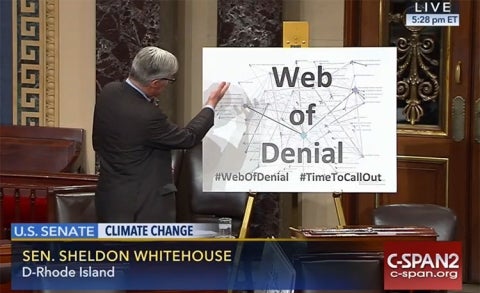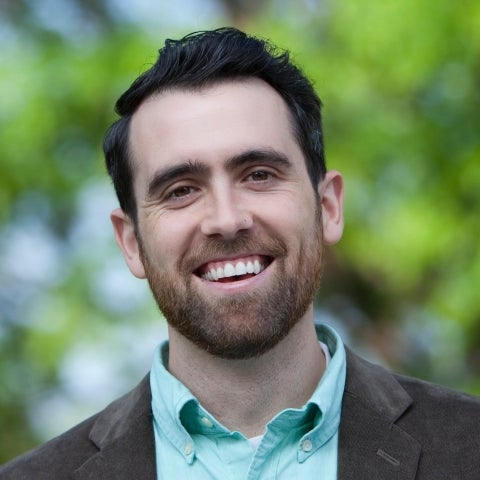Note: Yale School of the Environment (YSE) was formerly known as the Yale School of Forestry & Environmental Studies (F&ES). News articles and events posted prior to July 1, 2020 refer to the School's name at that time.

Last week, during two days of speeches, a group of 19 U.S. senators introduced a new resolution condemning certain corporations, think tanks, and other organizations for intentionally misleading the public about the seriousness and harmful effects of climate change. Calling the spread of misinformation about climate science a “web of denial,” Sens. Sheldon Whitehouse (D-R.I.) and Jeff Merkley (D-Ore.) cited recent research by Justin Farrell, assistant professor of sociology at the Yale School of Forestry & Environmental Studies, which suggests corporate funding has been used to systematically promote and encourage climate skepticism and impede federal climate change policy.
 Justin Farrell
Justin Farrell
We caught up with Farrell to learn more about his research and how it contributed to this historic resolution.
JUSTIN FARRELL: Since the research articles were published [in the Proceedings of the National Academy of Sciences and Nature Climate Change], different senators have used my research to make a more data-driven and evidence-based case concerning the role of corporate funding in climate change politics.
FARRELL: The endpoint for my data was 2013, so I can’t say for sure how this “ecosystem of influence” is currently operating. My sense — or perhaps blind hope — is that by exposing the deleterious impact of corporate funding in the U.S. on attitudes and policies to slow climate change, it will be more difficult for these corporate interests moving forward because it is no longer in the shadows. Like the tobacco companies in the 1990s, perhaps shining a light on this activity might help us as a nation turn the corner.
FARRELL: Free speech is certainly the bedrock of our democratic society, and bringing to light the actions of political and financial actors to suppress science and spread misinformation seems to me like a great example of free speech, rather than an attack on it.
FARRELL: We have an abundance of climate science documenting the myriad problems humanity faces, yet the story the past 15 to 20 years has been the inability of people to believe the science or to implement it into effective policy. In other words, climate change has become primarily a social and political problem, which places social scientists in an especially important position moving forward, and demands that more attention and resources be given to the human dimensions of environmental problems like climate change.
FARRELL: Many academics, especially at public institutions, working in social or natural science on climate change have suffered over the years from speaking the truth on climate change. Fortunately, Yale has supported my work — and it being a private school can shield me a bit from some of the political smearing and attacks [e.g., Freedom of Information Act emails]. I would be lying if I said that publishing this work was not stressful. It was something I thought a lot about, and at times I wondered if it was worth it. But those of us working in this arena have a solid support group, and those who came before me have provided really great advice about how to respond to attacks so that I was prepared when they inevitably came.
Q: How was your research used by the senators for the “web of denial” event?
JUSTIN FARRELL: Since the research articles were published [in the Proceedings of the National Academy of Sciences and Nature Climate Change], different senators have used my research to make a more data-driven and evidence-based case concerning the role of corporate funding in climate change politics.
You've said that corporate funding has an “ecosystem of influence” on the climate debate. In what ways is this “web” impacting federal climate change legislation and the upcoming election?
FARRELL: The endpoint for my data was 2013, so I can’t say for sure how this “ecosystem of influence” is currently operating. My sense — or perhaps blind hope — is that by exposing the deleterious impact of corporate funding in the U.S. on attitudes and policies to slow climate change, it will be more difficult for these corporate interests moving forward because it is no longer in the shadows. Like the tobacco companies in the 1990s, perhaps shining a light on this activity might help us as a nation turn the corner.
How do you respond to the assertion by conservative media that the Senate event was an attack on free speech?
FARRELL: Free speech is certainly the bedrock of our democratic society, and bringing to light the actions of political and financial actors to suppress science and spread misinformation seems to me like a great example of free speech, rather than an attack on it.
Your work untangles complex social networks, revealing coordinated campaigns to intentionally mislead the public about the science of climate change. What do you see as the role of social scientists in helping to promote a more productive climate discourse?
FARRELL: We have an abundance of climate science documenting the myriad problems humanity faces, yet the story the past 15 to 20 years has been the inability of people to believe the science or to implement it into effective policy. In other words, climate change has become primarily a social and political problem, which places social scientists in an especially important position moving forward, and demands that more attention and resources be given to the human dimensions of environmental problems like climate change.
Academics have often been the target of both professional and personal attacks by climate skeptic organizations. What has been the response of these organizations to your paper? Do you ever feel nervous publishing research such as this?
FARRELL: Many academics, especially at public institutions, working in social or natural science on climate change have suffered over the years from speaking the truth on climate change. Fortunately, Yale has supported my work — and it being a private school can shield me a bit from some of the political smearing and attacks [e.g., Freedom of Information Act emails]. I would be lying if I said that publishing this work was not stressful. It was something I thought a lot about, and at times I wondered if it was worth it. But those of us working in this arena have a solid support group, and those who came before me have provided really great advice about how to respond to attacks so that I was prepared when they inevitably came.
– Timothy Brown timothy.brown@yale.edu 203 436-9503
Published
July 19, 2016